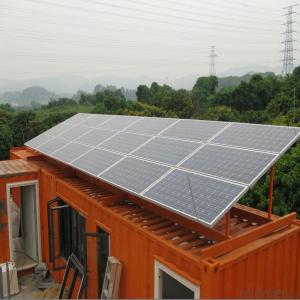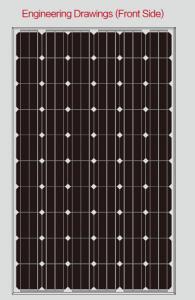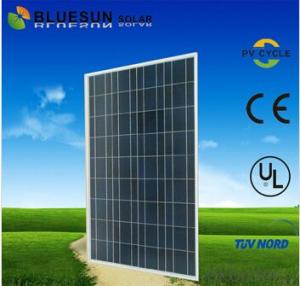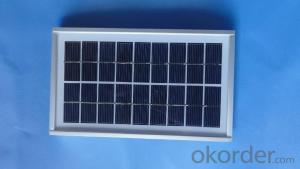CE and TUV Approved 180W Poly Solar Panel
- Loading Port:
- Shanghai
- Payment Terms:
- TT OR LC
- Min Order Qty:
- 10000 watt
- Supply Capability:
- 20000000 watt/month
OKorder Service Pledge
OKorder Financial Service
You Might Also Like
Item specifice
1. The Introduction of Solar Module
Solar modules use light energy from the sun to generate electricity through the photovoltaic effect. The majority of modules use wafer-based crystalline silicon cells or thin-film cells based on cadmium telluride or silicon. The structural (load carrying) member of a module can either be the top layer or the back layer. Cells must also be protected from mechanical damage and moisture. Most solar modules are rigid, but semi-flexible ones are available, based on thin-film cells.
2.Technical Parameter
Type | CNBM Solar Polycrystalline Series |
Materials | Silicon |
Guarantee | 12 yrs free from defects in materials and workmanship No less than 90% within 10yrs and no less than 80% within 25yrs TUV(IEC61215&IEC61730), CE, UL |
Application | Photovoltaic/ solar/ green energy/ energy saving |
Descriptions | 1.High efficiency crystalline silicon solar cell. Even if under the weak light, the solar module can produce maximum power output. 2.Tempered glass (toughened glass): Anti-reflecting coating and high transmission rate glass increase the power output and mechanical strength of solar module. 3. EVA and TPT: Using high quality EVA and TPT to prevent destroying and water. 4. AI frame: Without screw, rner connection. 6 holes on the frame can be installed easily. 5. Junction box: Multi function junction box with water proof. 6. Long lifetime: ≥25 years; Less power decrease. 7. Good performance of preventing from atrocious weather such as wind and hails. 8. Resisting moisture and etching effectively, not effected by geology. 9. The certificate issued by international authority: UL, TUV, IEC, CE.
|
Packaging Details: | 26pcs/pallet, 28pallets/ 40HQ Our solar panels are packed in cartons, and then pallet. Shipping by sea or by air are both ok, it up to customer’s chose. We’d like to inquiry the freight cost for customer after be informed exact quantity and destination address. |
3. Application and Pictures of Products
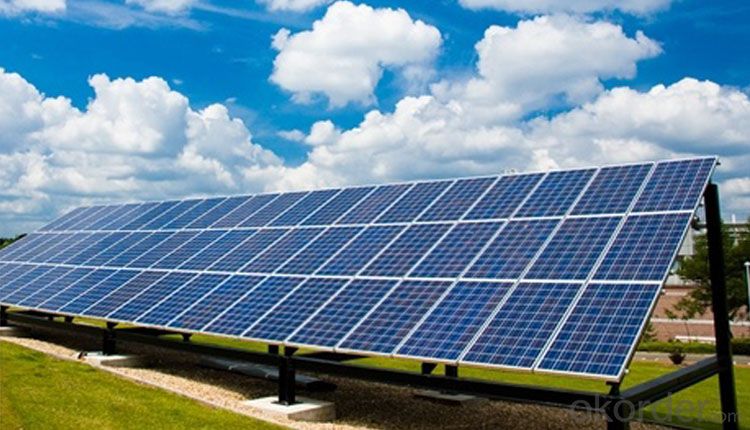
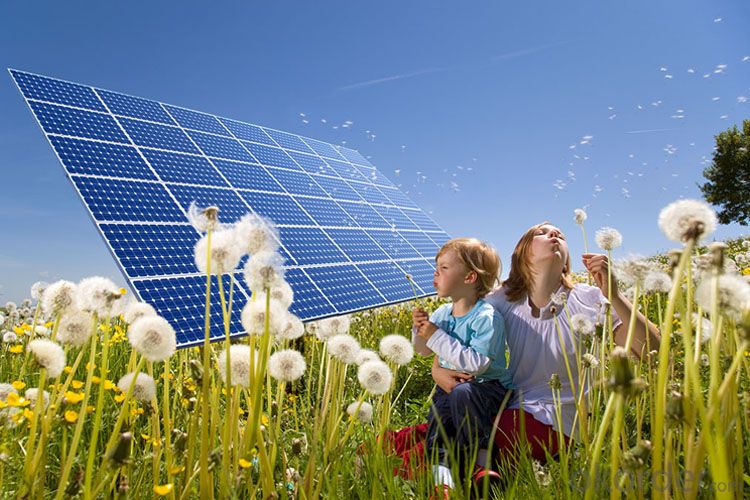
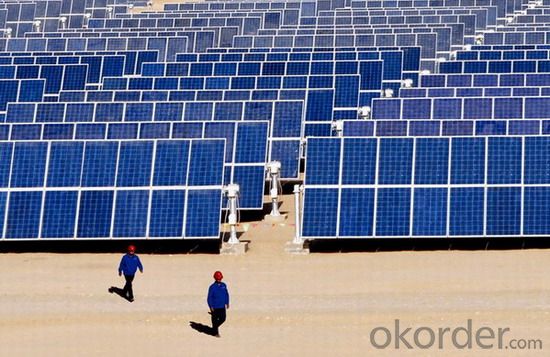
4. How to Work
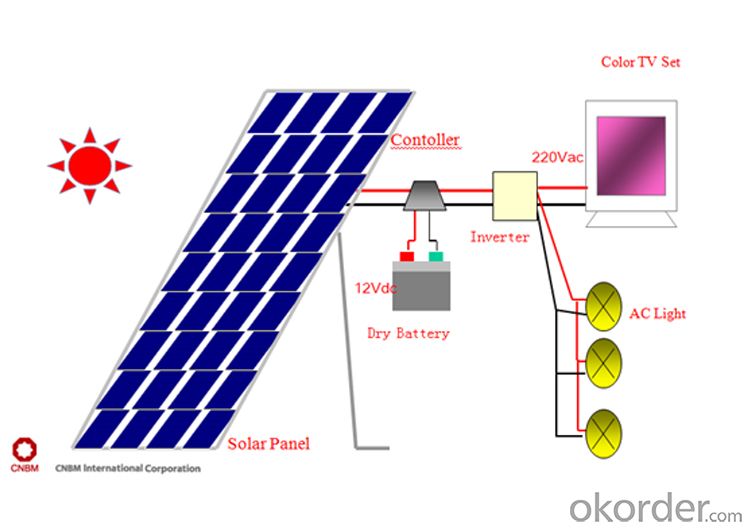
5. Packing Details
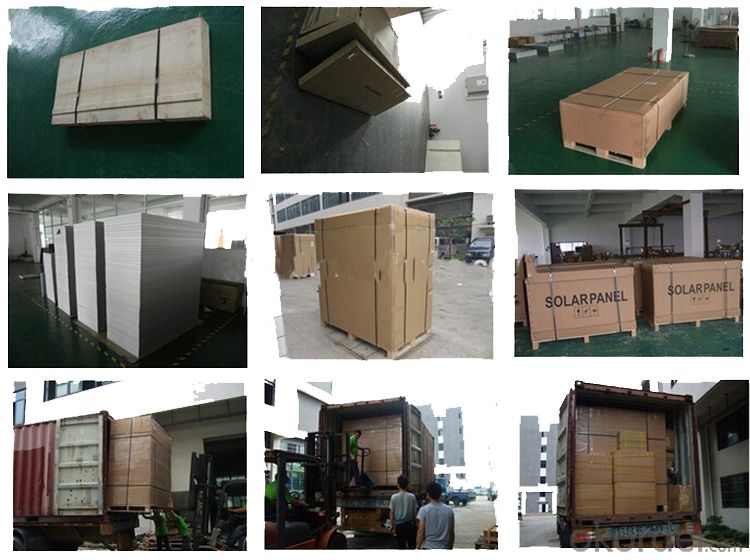
6. FAQ
Q1: What is the business type for the company?
A1: We are one of the biggest manufacturers in zhejiang.Chnia. Which is a high tech PV enterprise dedicated to the research, development, production and sales..
Q2: How long solar panel warranty can you offer?
A2: 10-Year product warranty,25-year linear power output warranty
If there is any quality problem, we will pay for freight and send free parts to you.
Q3: How many certificates do you have?
A3: We have 16 certificates,such as CE, TUV, UL, and so on.
- Q:Our school is in the process of being built, but they have no plans to include any environmental benefits. I was wondering how to get a grant for solar panels (at least) or who I can talk to in order to get a grant.
- I do not want to argue over the pay back period for solar panels but from the information I have been gathering, payback could be from 5-5 years, not 40. I guess it depends on the amount of sun that each panel will recieve, so maybe both could be partially correct. Another item to be aware of is that while the cost of your panels and the electricity generated by them will remain stable or decrease significantly for 25 years, the cost of your other energy sources will generally be increasing , perhaps very significantly. Since your school is being built now, it will need a roof. There are photovoltaic shingles for this. Look into it yourself. Do a google search for google green and see what they are doing already. Present this information to your PTA and any other organization who might have influence. This is really a time for your generation to step up and stop listening to nay sayers. Think for yourself, study, research it and broadcast everything you learn to others.
- Q:I need help?!!
- They are costly, although technology is improving. To generate enough current to be useful, the panel needs to be large quite large. The sun tracks at different angles depending on the season and the solar panel would need to be repositioned to get maximum current generation because of this.
- Q:Are there any risks of fire associated with solar panels?
- Yes, there are certain risks of fire associated with solar panels, although they are relatively low compared to other energy sources. Potential causes of fire include electrical malfunctions, improper installation or maintenance, and damage from external factors such as lightning or extreme weather conditions. However, modern solar panel systems are designed with safety measures in place to minimize these risks, including fire-resistant materials and enhanced electrical protection. Regular inspections and adherence to installation guidelines can further reduce the chances of fire incidents.
- Q:Can solar panels be installed on a pergola or awning?
- Yes, solar panels can be installed on a pergola or awning. In fact, these structures can provide an ideal platform for solar panel installation, as they offer ample sunlight exposure and an elevated position that maximizes energy production. Installing solar panels on a pergola or awning can not only generate clean and renewable energy but also provide shade and protection from the elements.
- Q:The ancients used skylights for light in lieu of electricity. Light was used for drying, even cooking foods and drying clothes. Solar clocks/sun dials were once popular but now we have battery operated clocks. Where have we tapped into any of these resources since the outdated solar clothes drier nicknamed the 'clothes line'?
- Crikey yes, all these terms should be googleable Solar chimney Solar cooker Passive solar Solar trough Solar water heating Double glazing I'm sure there are more, I thought clothes lines were powered by the wind?
- Q:Looking to install solar panels in my house.
- Wholesale prices for BP solar panels range between $335 for the 40 watts panel to $835 for the 70 watts panel. Here's a brief listing of wholesale prices for BP solar models: - BP340J solar panel (40 watts) @ $335 - BP350J solar panel (50 watts) @ $37 - BP375J solar panel (80 watts) @ $504 Right now I'm getting a series of 50 watt (7.5 volts) panels installed in my house. It's a start to reduce dependence on electricity bills and try get some tax rebates as well.
- Q:My electric bill per month averages 800 kWh per month. I am looking at 65W solar panels. How many panels would I need to make my bill come to zero? I realize I also need an inverter to convert dc to ac.
- There is always a lot of confusion on this question so I built a webpage to show people how to do the math and pick the right system size. Most all public utilities will trade you kWh for kWh and then either settle up with you at the end of the month or every 2 months. So one week you might have all rainy days but the next 3 weeks you have 0 hours of bright sun even in the winter. This means you have no need to put batteries on your system unless you have a lot of power outages. Then you only need a few hours of battery backup power. At most 24 hours.
- Q:Can solar panels be used in remote areas with no access to the grid?
- Yes, solar panels can be used in remote areas with no access to the grid. Solar panels generate electricity from sunlight, making them an ideal solution for off-grid locations where traditional power infrastructure is unavailable. They can be installed in remote areas to provide a reliable and sustainable source of energy, allowing for essential power needs such as lighting, charging devices, and running small appliances even in areas far from the grid.
- Q:I have made a 5v dc 52watt solar panel and I going to be trying to charger 4 2v dc 55ah batteries. I get about 6 hours of sun on my panel. Spec below, is that a big enough panel to charge the batteries???I have 30 3x6 solar cells wired together Cell Specifications: (Watts): .75 Wp (Amps): 3.5 Imax (Volts): 0.5 V max which is where I got my 5g 52watt max (if math is wrong plz tell me) The Battery type: 2Volt 55.0ah NB Sealed Lead Acid Battery. I am using a mppt solar charger.
- Technically, any solar panel can charge any battery, but it would take quite a long time do do so if it is a large battery. If you are aware of the voltage and either amp or watt rating of the unit that is usually used to charge the battery, the solar panel should have a similar power output to that charger to work well. amps and watts are quite similar, and can be converted with this simple formula: W=watts; V=volts; A=amps; W/V=A; V*A=W; When charging batteries, it is always wise to use less amps than needed, and roughly the same voltage as the battery being charged. The less amps used to charge batteries means the battery will take longer to charge but will last a lot longer in the long-term. Your solar panel should be sufficient to charge the battery, but you should test charge it to see if it works well. I recommend using a multimeter to check the batteries voltage every couple of hours. Once the battery reaches 2v, it should be fully charged. You should also check the amps in case they are not at the expected value (take caution when checking amps with a multimeter, when i do it i always end up melting my multimeter leads). The battery should be fully charged from anywhere between 6-48 hours. if it is charging faster, the solar panel has too much power. if it doesn't charge in this time frame, the solar panel is not powerful enough.
- Q:How hard is it to install solar energy panels on your house? Is this a reasonable way to produce 00% of your house's energy? Is there any danger?
- Hi okorder
1. Manufacturer Overview |
|
|---|---|
| Location | |
| Year Established | |
| Annual Output Value | |
| Main Markets | |
| Company Certifications | |
2. Manufacturer Certificates |
|
|---|---|
| a) Certification Name | |
| Range | |
| Reference | |
| Validity Period | |
3. Manufacturer Capability |
|
|---|---|
| a)Trade Capacity | |
| Nearest Port | |
| Export Percentage | |
| No.of Employees in Trade Department | |
| Language Spoken: | |
| b)Factory Information | |
| Factory Size: | |
| No. of Production Lines | |
| Contract Manufacturing | |
| Product Price Range | |
Send your message to us
CE and TUV Approved 180W Poly Solar Panel
- Loading Port:
- Shanghai
- Payment Terms:
- TT OR LC
- Min Order Qty:
- 10000 watt
- Supply Capability:
- 20000000 watt/month
OKorder Service Pledge
OKorder Financial Service
Similar products
New products
Hot products
Related keywords
